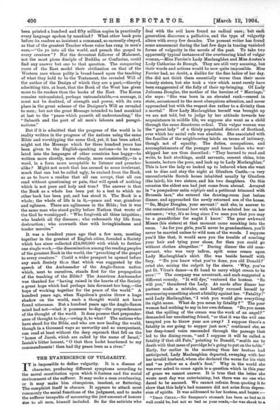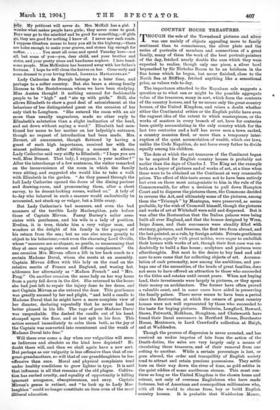THE EVANESCENCE OF VULGARITY.
IT is impossible to define vulgarity. It is a disease of character, producing different symptoms according to the moral constitution upon which it fastens and the social environment of the sufferer. It may make a man overbearing, or it may make him obsequious, insolent, or flattering. The complaint itself is obscure. It appears to attack most commonly the social functions of the judgment, and to make the sufferer incapable of measuring the just amount of honour due to all men, himself included. So far the satirists who
deal with the evil have found no radical cure; but each generation discovers a palliative, and the type of vulgariti alters with every few decades. The present writer has found some amusement during the last few days in tracing vanished forms of vulgarity in the novels of the past. To take two apparently typical instances of the overbearing kind of vulgar woman,—Miss Ferrier's Lady Maclaughlan and Miss Austen's Lady Catherine de Bourgh. They are still very amusing, but their words and actions would be now quite impossible. Miss Ferrier had, no doubt, a dislike for the fine ladies of her day. She did not think them essentially worse than their more homely sisters, but she took a view which must surely have been exaggerated of the folly of their up-bringing. Of Lady Julianne, Douglas, the mother of the heroine of "Marriage," she says : "She was born in an elevated rank—reared in state, accustomed to the most obsequious attention, and never approached but with the respect due rather to a divinity than a mortal." How Lady Maclaughlan herself was brought up we are not told, but to judge by her attitude towards her acquaintance in middle life, we suppose she went as a child through the same disastrous ordeal. This vulgar woman was the "great lady" of a thinly populated district of Scotland, over which her social rule was absolute. She associated with the families of the neighbouring lairds on terms of intimacy, though not of equality. The duties, occupations, and accomplishments of the younger and lesser ladies who wor- shipped her are thus described : "They learned to read and write, to knit stockings, scold servants, cement china, trim bonnets, lecture the poor, and look up to Lady Maclaughlan." This is how the lady so looked up to behaved when she went out to dine and stay the night at Glenfern Castle,—a very uncomfortable Scotch house inhabited usually by Glenfern (the laird), his two sisters, and his two daughters. On this occasion the eldest son had just come from abroad. Arrayed in "a pompadour satin nggliges and a petticoat trimmed with Brussels lace," she entered the drawing-room just before dinner, and approached the newly returned son of the house. " So, Major Douglas, your servant ! ' said she, in answer to the constrained formal bow with which he saluted her on her entrance ; why, it's so long since I've seen you that you may be a grandfather for aught I know.' The poor awkward Misses (his sisters) at that moment came sneaking into the room. As for you girls, you'll never be grandmothers, you'll never be married unless to wild men of the woods. I suppose you'd like that, it would save you the trouble of combing your hair and tying your shoes, for then you could go without clothes altogether." During dinner the old man- servant, who was very infirm, spilt some cream upon Lady Maclaugblan's skirt. She was beside herself with fury. "Do you know what you've done, you old Donald ? ' cried she, seizing the culprit by the sleeve. 'Why, you've got St. Vitus's dance—a fit hand to carry whipt cream to be sure !' " The company was awestruck, and each suggested a different remedy. "It will dye," ventured the hostess. "So will you," thundered the Lady. At cards after dinner her partner made a mistake, and hastily excused herself by murmuring something about a fatality against her. "Fatality!" said Lady Maelaughlan, "I wish you would give everything its right name. What do you mean by fatality?" The poor woman had nothing to say in her own defence. "Do you mean that the spilling of the cream was the work of an angel?" demanded her unrelenting friend, "or that it was the evil one tempted you to throw your ace away ? I suppose there's a fatality in our going to supper just now," continued she, as her deep-toned voice resounded through the passage that led to the dining-room, "and I suppose it will be called .a fatality if that old Fate," pointing to Donald, "scalds me to death with that mess of porridge he's going to put on the table." Early, far earlier in the morning than her hostess had anticipated, Lady Maclaughlan departed, sweeping with her her invalid husband, whom she declared the worse for his visit and "as yellow as a duck's foot." Why in the world she was ever asked to come again is a question which in this year of grace we cannot answer. It is true that the letter she wrote next day was entertaining, but there was no one who dared to be amused. We cannot refrain from quoting it to show that this lady's bad manners did not arise from depres- sion of spirits. It was addressed to her hostess, and began :— jellY. My petticoat will never do. Mrs. Mallall has a girl. I wonder what makes people have girls ; they never come to good.
Boys may go to the mischief and be good for something,—if girls go, they are good for nothing I know of. I never saw such roads. I suppose Glenfern means to bury you all in the highway,—there are holes enough to make your graves, and stones big enough for coffins You must all come and spend Tuesday here—not all, but some of you—you, dear child, and your brother and
sister, and your pretty niece and handsome nephew. I love hand- some people. Wigs Moltraken has bounced away with her father's footman. I hope he will clean the knives on her. Come early and come dressed to your loving friend, ISABELLA MAOLAIIGHLAN."
Lady Catherine de Bourgh belongs to a later time, and perhaps to a softer country. Bat. she bears a strong family
likeness to the Scotchwoman whom we have been studying.
Miss Austen thought it nothing unusual for fashionable people to be " high " and "ate up with pride." Still, she allows Elizabeth to show a good deal of astonishment at the behaviour of her distinguished guest on the occasion of her only visit to Longburn. "She entered the room with an air more than usually ungracious, made no other reply to Elizabeth's salutation than a slight inclination of the head, and sat down without saying a word." Elizabeth had men- tioned her name to her mother on her ladyship's entrance, though no request of introduction had been made. Mrs. Bennet, all amazement, though flattered by having a, guest of such high importance, received her with the utmost politeness. After sitting a moment in silence, Lady Catherine said very stiffly to Elizabeth : "I hope you are well, Miss Bennet. That lady, I suppose, is your mother ? " After the interchange of a few sentences, the visitor remarked on the inconvenience of the room in which the family were sitting, and suggested she would like to take a walk with Elizabeth in the garden. "As they passed. through the ball Lady Catherine opened the doors of the dining parlour and drawing-room, and pronouncing them, after a short survey, to be decent-looking rooms, walked on." A lady of to-day who behaved in such a manner would undoubtedly be accounted, not stuck-up or vulgar, but a little crazy.
But Lady Catherine's bad manners, and even the bad manners of the terrible Lady Maclaughlan., pale before those of Captain Mirvan. Fanny Barney's sailor ass°. elates with gentlemen, and his wife is a lady of position. Evelina, it is true, thinks him a very vulgar man, and wonders at the delight of his family in the prospect of his return from the sea; but no one else seems greatly to object to his behaviour,—not even the charming Lord Orville, whose "manners are so elegant, so gentle, so unassuming that they at once engage esteem and diffuse complacence." On one occasion Mrs. Mirvan offers a lift in her hack coach to a certain Madame Duval, whom she meets at an assembly. Captain Mirvan differs with this lady on the road on the relative merits of France and England, and waxing hot, addresses her alternately as "Madam French" and "Mrs. Frog." On another occasion the same lady on her way home from a party fell down in the dirt. She returned to the house she had just left to repair the injury done to her dress, and met Captain Mirvan as she entered the door. This gentleman was greatly amused by her sad plight, "and held a candle to 'Madame Duval that he might have a more complete view of her disaster, declaring repeatedly that he never had been better pleased in his life. The rage of poor Madame Duval was unspeakable. She dashed the candle out of his hand. stamped upon the floor, and at last spit in his face. This action seemed immediately to calm them both, as the joy of the Captain was converted into resentment and the wrath of Madame Duval into fear."
Will there ever come a day when our vulgarities will seem as ludicrous and obsolete as the kind here depicted P No doubt there will, and then we shall again have a new sort. But perhaps as our vulgarity is less offensive than that of our great-grandmothers, so will that of our granddaughters be less offensive than ours. Moral and physical complaints tend under healthy conditions to grow lighter in type. It is said that influenza is all that remains of the old plague. Cultiva- tion has curbed cruelty, and equality of opportunity is killing ignorant arrogance, obsequiousness, and envy. Captain Mirvan's genus is extinct, and "to look up -to Lady Mac- laughlan" could-no longer constitute an item even of the most illiberal education.











































 Previous page
Previous page